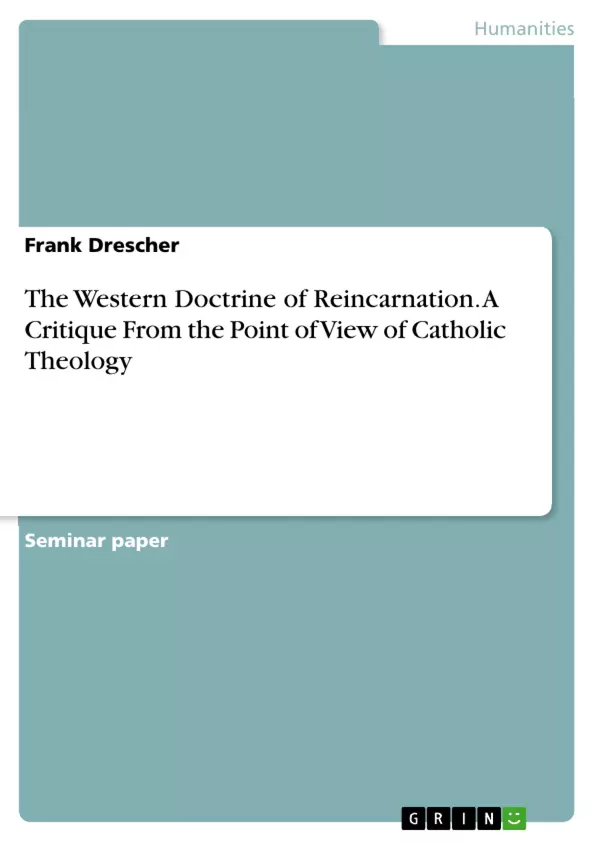In this contribution I am not looking for confrontation with those who believe in a doctrine of reincarnation. Nor do I want to be a dogmatic know-all or the kind of person who superciliously dismisses the faith-context of two world religions (i.e., Hinduism and Buddhism). Explicity, what I am offering is a clear, positive statement of the Christian faith itself, which has been increasingly called into question in our society in recent decades.
Unfortunately this questioning goes hand-in-hand with a (by now) widespread religious indifference on the part even of those of our fellow-citizens who regard themselves – in the broadest sense – as adherents of the Christian religion. My critique is therefore quite deliberately addressed to those within the Christian fold who would attempt to fabricate a western-style syncretizing version of the doctrine of reincarnation and amalgamate it with Christian convictions.
Table of Contents
- Introduction
- Reincarnation - a question for Christian theology?
- Reasons why the doctrine of reincarnation is theologically incompatible with the Christian faith
- Concluding remarks
Objectives and Key Themes
This text aims to provide a clear and positive statement of the Christian faith, which has been increasingly questioned in recent decades. It critiques the doctrine of reincarnation from the perspective of Catholic theology, addressing those who might attempt to merge it with Christian convictions.
- The incompatibility of the doctrine of reincarnation with the Christian belief in Creation
- The significance of the Christian concept of immortality as a gift from God
- The role of the human soul in the relationship between man and God
- The importance of the Christian tradition of faith and resurrection
- The distinction between the Christian and non-Christian perspectives on death and the afterlife
Chapter Summaries
- Introduction: This chapter sets the stage for the critique, emphasizing the importance of peaceful dialogue between religions while maintaining a clear and unwavering stance on the Christian faith. It also acknowledges the increasing religious indifference within Western society and the need to address the questioning of Christian beliefs.
- Reincarnation - a question for Christian theology?: This chapter examines the historical development of the doctrine of reincarnation and its relation to early Christianity, emphasizing the lack of evidence for its acceptance within the early Church. It also addresses the views of contemporary theologians, such as Karl Rahner, Hans Küng, and Michael von Brück, who have explored the potential integration of reincarnation into Christian theology.
- Reasons why the doctrine of reincarnation is theologically incompatible with the Christian faith: This chapter delves into the fundamental reasons why the doctrine of reincarnation is incompatible with the Christian faith, focusing on the Christian beliefs in Creation, the nature of the human soul, and the concept of immortality as a gift from God. It further emphasizes the importance of the Christian tradition of faith and resurrection as the foundation of the Christian faith.
Keywords
The key topics and concepts addressed in this text include the Christian faith, reincarnation, Catholic theology, Creation, human soul, immortality, resurrection, and the relationship between man and God. It explores the historical development of Christian belief and contrasts it with the doctrine of reincarnation, highlighting the fundamental differences between these two worldviews.
Frequently Asked Questions
Why is the doctrine of reincarnation incompatible with Christian theology?
The text argues that reincarnation contradicts the Christian belief in Creation, the uniqueness of the human soul, and the concept of resurrection as a gift from God.
Does the Bible or early Christianity support reincarnation?
According to Catholic theology presented in this work, there is no evidence that reincarnation was ever an accepted belief within the early Church or the biblical tradition.
What is the Christian view of immortality?
In Christianity, immortality is viewed not as a natural cycle of the soul but as a grace-filled gift from God through the resurrection of the body.
Who is the primary audience for this critique?
The critique is specifically addressed to Christians who attempt to merge Western-style reincarnation ideas with their Christian faith (syncretism).
How does the text view other religions like Hinduism or Buddhism?
The author states they are not looking for confrontation with Eastern religions but rather aim to clarify the distinct and positive statement of the Christian faith.
- Citar trabajo
- Frank Drescher (Autor), 2002, The Western Doctrine of Reincarnation. A Critique From the Point of View of Catholic Theology, Múnich, GRIN Verlag, https://www.grin.com/document/347165



